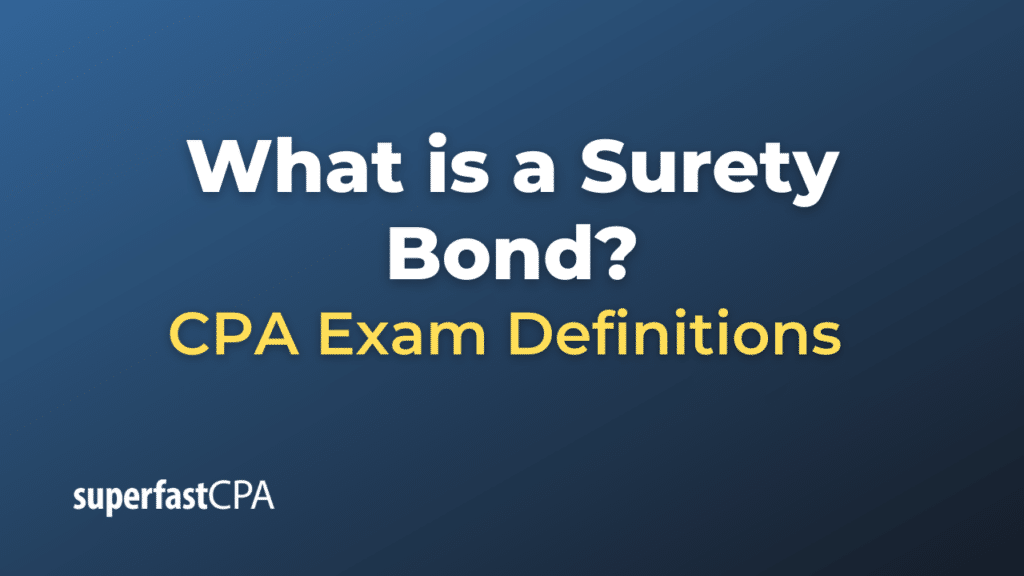Surety Bond
A surety bond is a contractual agreement between three parties that guarantees that a specific obligation will be fulfilled. It ensures that one party (the principal) will meet its commitment to another party (the obligee). If the principal fails to meet their obligation, the surety (typically an insurance company) will compensate the obligee for losses incurred or ensure that the obligation is completed.
The three main parties involved in a surety bond are:
- Principal: The party that is required to perform a specific obligation or duty. This could be a contractor, a business owner, or any other entity that has a contractual commitment.
- Obligee: The party that is the recipient of the obligation. They are the beneficiary if the principal fails to meet its commitment. For instance, in construction, this could be the project owner or the government agency that required the bond.
- Surety: Usually an insurance company, the surety guarantees that the principal will fulfill its obligation. If the principal defaults, the surety is responsible for fulfilling the commitment or compensating the obligee. However, the surety will then seek reimbursement from the principal for any amounts paid out or costs incurred.
Common types of surety bonds include:
- Performance Bonds: Guarantees that a contractor will complete a project according to the terms of the contract.
- Bid Bonds: Ensures that a contractor will enter into a contract at the bid price if they are awarded the project.
- Payment Bonds: Guarantees that subcontractors and suppliers will be paid by the contractor.
- License and Permit Bonds: Required by government agencies before professionals can get licenses or permits to operate in certain fields or jurisdictions.
- Judicial Bonds: Required in certain legal cases to ensure payment for court-mandated judgments.
A surety bond is not an insurance policy. While insurance policies are designed to protect the insured from unforeseen events, surety bonds protect the obligee from any misconduct or failure of the principal to fulfill their obligations. If a claim is made against a bond, the surety will pay the claim to the obligee, but will then seek reimbursement from the principal.
Example of a Surety Bond
Let’s explore the concept of a surety bond through a hypothetical scenario involving a city’s construction project.
Scenario: The “Sunshine City” plans to build a new community center. The city wants to ensure that the project will be completed as per the agreed terms and that all subcontractors and suppliers will be paid. Thus, they require bidding contractors to secure a performance bond and a payment bond.
Parties Involved:
- Principal: “Skyline Builders,” a construction firm bidding for the community center project.
- Obligee: “Sunshine City Council,” the entity wanting the community center built.
- Surety : “Guardian Bonding Company,” a firm that issues surety bonds.
Sequence of Events:
- Contract Awarded: “Skyline Builders” wins the bid to construct the community center for $5 million. As part of the contract, Sunshine City Council requires Skyline to obtain a performance bond and a payment bond.
- Surety bonds Obtained: Skyline Builders approaches “Guardian Bonding Company” to secure both bonds. After assessing Skyline’s financial stability and past performance, Guardian agrees to issue both the performance and payment bonds for a premium.
- Potential Default: Six months into the project, due to unforeseen financial difficulties, Skyline Builders struggles to pay its subcontractors and suppliers. Additionally, there are concerns that they might not be able to complete the project on time.
- Claim on Bonds:
- Payment Bond: One of the subcontractors, who hasn’t been paid for three months, makes a claim on the payment bond. Guardian Bonding Company investigates the claim, verifies its legitimacy, and pays the owed amount to the subcontractor.
- Performance Bond: Given the financial difficulties Skyline is facing, Sunshine City Council becomes concerned about the timely completion of the community center. If Skyline fails to keep up with the project timeline, the city can make a claim on the performance bond. If validated, Guardian might opt to hire another contractor to finish the project or financially support Skyline Builders to ensure completion.
- Reimbursement: Guardian Bonding Company, after paying out claims, seeks reimbursement from Skyline Builders for the amounts paid out, plus any associated expenses.
This example showcases the protective role of surety bonds. The Sunshine City Council, through the bonds, ensured that subcontractors and suppliers would be paid and that the community center would be completed, even if the original contractor faced challenges. On the other hand, Guardian Bonding Company took on the risk, but also has the right to seek repayment from Skyline Builders.













